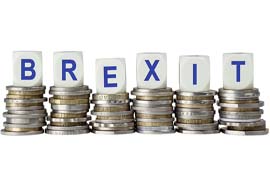
March 10, 2016

Source: Bigstock
“The peculiar essence of our financial system is an unprecedented trust between man and man; and when that trust is much weakened by hidden causes, a small accident may greatly hurt it, and a great accident may almost destroy it.”
“Walter Bagehot, Lombard Street (1873)
Bagehot’s description of contagion in economic crises rings equally true when applied to Europe’s “single market” today. A deterioration of Bagehot’s “trust””of goodwill, common cause”dogs the U.K.’s participation in the EU today, following years of continuing economic crisis focused on the continent.
The U.K.’s potential departure from the European Union is a controversy so interminable that Britons have been arguing over it since we were teenagers. It is a matter so antagonistic that any discussion quickly becomes a crashing bore. Not unlike debates over euthanasia, teenage pregnancy, or gay adoption…you just can”t win. The fact is, nobody agrees whether or not exit is a good idea.
The trick with such “political hot potatoes” is to avoid them or risk entrapment by a conversational black hole. Now avoidance is no longer an option. On June 23, U.K. citizens will vote upon leaving the EU in an exceptional referendum that the press refers to as “Brexit.”
What would Brexit’s impact upon London be? Upon arguably the world’s No.1 financial hub? After all, Europe’s economic bloc constitutes a global superpower. As the largest single market on the planet, severing Britain’s alliance could entail serious consequences.
A Business Insider feature last year entitled “Europe is bigger than the US“ quotes chief market strategist for US Trust Joseph Quinlan on Europe’s politico-economic power: “In nominal U.S. dollar terms, the European Union (plus Norway, Switzerland, Iceland) accounted for 25.4% of world output in 2014, according to data from the International Monetary Fund. That was greater than America’s share (22.5%) and well in excess of China’s”13.4%.”
In a connected world, Brexit is also a destabilizer big enough for President Obama’s most senior trade official to forewarn that America is “not in the market” for a free-trade deal with Britain alone. “We”re building platforms that other countries can join over time,” said Michael Froman. (As opposed to Free Trade Agreements [FTAs] with individual nations.) “We have no FTA with the U.K. so they would be subject to the same tariffs…as China, or Brazil or India.”
Political insiders believe British prime minister David Cameron should have wrested greater compromises from the EU during his last negotiating round. Whatever concessions Cameron did extract from the EU, his own party views them as unacceptably minor, fueling the anti-Europe sentiment.
Ben Elliot is an investor and founder of Quintessentially Group, Ltd. (a global members” club catering to the needs and whims of Ultra or High Net Worth clients, or U/HNWs). He confirms that foreign HNWs residing in the U.K. today are fearful about an exit’s consequences. For them the U.K. is a tax haven, a nation whose way of life (and rule of law) they appreciate and have adopted. Any change to this status quo constitutes a risk to their now-established lives in their adoptive nation. New restrictions will be hard to accept.
From his London HQ, Mr. Elliot consults frequently with a diverse range of globally mobile investors and businessmen in the U/HNW bracket. He concludes that public opinion over Brexit varies widely from person to person.
For instance, says Elliot: “”Heavy Finance” stands firmly against the idea of an exit from the EU.” Their fear is that an exit will destroy the Conservative Party’s leadership, eventuating in the election of Labour leader Jeremy Corbyn to prime minister. The PM’s pro-Europe stance has already divided and could (theoretically) destroy the Conservative Party. Wealth managers say High Net Worth (HNW) clients are the most concerned about an exit.
Many of Elliot’s U/HNW clients, including a fair number of billionaire investor and entrepreneur types, specifically “came here [to the U.K.] as a gateway to Europe. So now they”re thinking: What if… Then what next?“ he explains. They”re equally worried about the knock-on effect of a departure because “many of them are long on the pound (£) sterling,” he adds. The U.K. currency has fallen several percent already on fears of an imminent EU departure, and Goldman Sachs warns that sterling may drop by 20% altogether if the exit happens.
On the other hand, Elliot explains that the bigger British hedge funds like Crispin Odey’s “love the idea [of a U.K. exit]. The hedge funds are very much pro-Brexit. And they”re equally against the EU, with all its red tape and heavy business regulation.” Finally, says Elliot, he encounters quite alternative perspectives, like those of a “near-Eastern billionaire who said to us: “You guys are crazy to think you can go it alone!””
The U/HNW set is already concerned about Britain’s changing rules regarding “non-dom” status, terrified their own status might one day be revoked. The good news is that when the charge paid by non-doms was introduced in 2008, an exodus of the wealthy was duly anticipated, and…wrongly, as it turned out. A hundred and twenty thousand non-doms were registered in 2013″14, a small increase on the year before.
A major question is whether EU nationals already working here would need to apply for a visa if Brexit occurred. If so, a great deal of banking talent would flee the city of London for an alternative like Frankfurt or Paris.
“Freedom of movement is one of the tenets of the EU,” too, writes Hugo Greenhalgh in the FT. “If that is repealed, what will happen to the 5.6 million expatriates remains unclear.” Additionally, if Brexit happens, the flight of the superrich out of the U.K. would hurt the high-end property market. Early warning signs reflect this danger already, with a 1.1% drop in prime-central London sales.